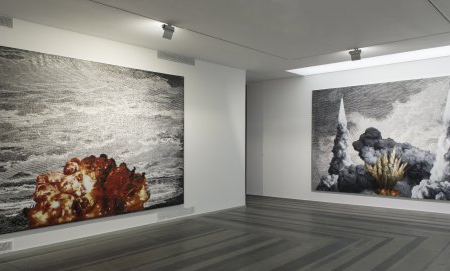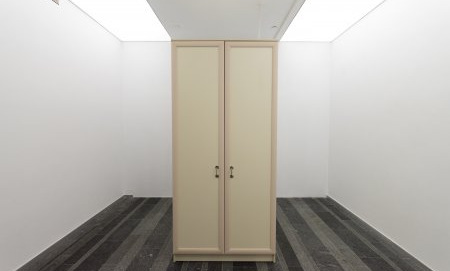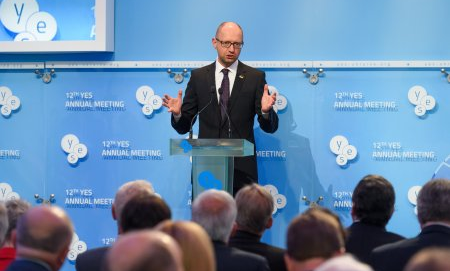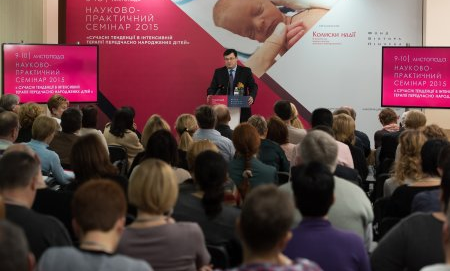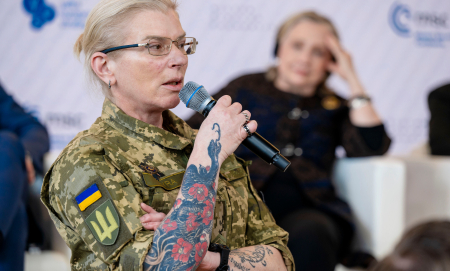News
Victor Pinchuk Foundation Held the 4th Ukrainian Lunch on the Margins of the Munich Security Conference
On February 15, 2020, Victor Pinchuk Foundation and Yalta European Strategy (YES) held the 4th Ukrainian Lunch in Munich, titled “Ukraine – Moving Ahead” that was organized on the margins of the Munich Security Conference. In attendance were political and business leaders, experts and media from Ukraine and the world.
Kersti Kaljulaid, President of Estonia; Mircea Geoană, Deputy Secretary General of NATO; Peter Hultqvist, Minister for Defence of Sweden; Miroslav Lajčák, Minister of Foreign and European Affairs of the Slovak Republic, Edi Rama, Prime Minister of Albania; and Stanislav Asieiev, Author of Radio Liberty were among the speakers. President of Ukraine Volodymyr Zelensky joined the discussion as a speaker of honour. Richard Haass, President, Council on Foreign Relations, moderated the discussion.
Opening the event, Victor Pinchuk, businessman and philanthropist, said: “It is great to see so many friends from many countries and from many political camps. This shows that support for Ukraine is strong, regardless of political and party conflicts. This is so important. Ukraine is strong, there is progress, regardless of stereotypes. The reality of change and progress will be stronger than stereotypes.”
President of Ukraine Volodymyr Zelensky emphasised the need for Ukraine to remain in the international focus: “We realize how important it is for Ukraine not to disappear from the international radars, especially, with regard to security. Today’s world faces numerous challenges and threats. The war in Ukraine and the annexation of Crimea have been on for the sixth year now, and the international community must not get used to it. It will be possible to talk about stabilization of security in the European region only once comprehensive peace is established in Donbas and Ukraine gets its territories restored within the internationally recognized borders. It was not us who started that war, but it is up to us to finish it. For that, Ukraine keeps moving invariably along the diplomatic path by fulfilling the agreements reached within the Normandy Format. Without a full and sustainable ceasing of hostilities, it is impossible to resolve any political issues on these Ukrainian territories. We are sure that peace will be established in Donbas, and the phrase “temporarily uncontrolled territories” will vanish forever.”
Kersti Kaljulaid, President of Estonia, stressed: “For three years that I have been the president, once a week, I have been getting a memo about Ukraine, and it starts with the numbers of people injured or dead in the conflict. And these numbers keep ticking, even now, as we are having our lunch here. Ukraine is not in a frozen conflict, it is in a forgotten conflict. Many people want to forget it, but it is not frozen, it is a very hot conflict. What I am worried about is that we in Europe are so eager to help Russia that we might do it at the expense of Ukraine. We are so eager to normalise the relations, but the war is continuing. Some steps have been made, but these are small steps, and we need to move in bigger steps. We should stand strong for Ukraine. We are not standing strong for Ukraine, we are standing strong for Europe without wars. Because if we return to business as usual, then the question is what’s next. We need a strategic patience to help Ukraine.”
Wolfgang Ischinger, Chairman of Munich Security Conference and member of YES Board who came to greet the participants, said: “Here in the European Union, we often claim that we have created a continent of peace and we do not conduct wars anymore. It is very important that you, Ukrainians, remind us and that we remind ourselves that it is actually not true. There is still a war going on, and we have to make a much greater, more intense collective effort to bring it to an end. That is our task for the weeks, months, hopefully, not years ahead.”
Peter Hultqvist, Minister for Defence of Sweden, said: “There can be no talk about spheres of influence, buffer zones, inequal rights to sovereignty and territorial integrity, and there can be no states in-between. That is very important. Because, if we do not accept international law and regulations, if we accept buffer zones and spheres of influence, then we are on a real slippery slope. In the end, the world order will be that the stronger dictate for the smaller. If we are now discussing a way that we should have business as usual with Russia and that we should forget Crimea, if we cannot solve these issues and we get back to what we call a normal situation, then we are losers, and we will see new bad things happen sooner or later. It is very important to not accept spheres of influence or buffer zones. We must act with solidarity.”
Stanislav Asieiev, Author of Radio Liberty said: “In 2012, my hometown Donetsk hosted the European football cup, with a new airport, railway station and stadium. And now, in 2020, there are no such things in Donetsk. There is only the so-called MGB instead: a prison where I spent 28 months. And this was an eye-opener for me on the true situation. It is not only about Russian aggression. We are dealing with something that is related not only to the war: people are tortured there. It is not about the war alone, it is about inhuman attitude to the people. We should remember about the people imprisoned there. I am telling this for you to understand that when we negotiate about these territories with the Russian Federation, we must not focus only on borders and territories, we must focus on freedom that cannot be a bargaining chip. People living there see what is happening, but Ukrainians living on the mainland may not be fully aware of those tortures and misery. We must not forget about that.”
Among participants of the event also were: Will Hurd, Member of the U.S. House of Representatives; Chris Murphy, U.S. Senator; Robert Portman, U.S. Senator.
For the fourth time, the Ukrainian Lunch in Munich served as a platform where global and Ukrainian decision makers discussed questions of Ukraine’s security and its implications for Europe and the international order. Among previous speakers were Chrystia Freeland, Robert Gates, Ben Hodges, Wolfgang Ischinger, David Lipton, Anders Fogh Rasmussen, David Petraeus, and Anders Samuelsen.
Over the past five decades, the Munich Security Conference (MSC) has become the major global forum for the discussion of security policy. Each February, it brings together more than 500 senior decision-makers from around the world, including heads-of-state, ministers, leading personalities of international and non-governmental organizations, as well as high ranking representatives of industry, media, academia, and civil society, to engage in an intensive debate on current and future security challenges.













